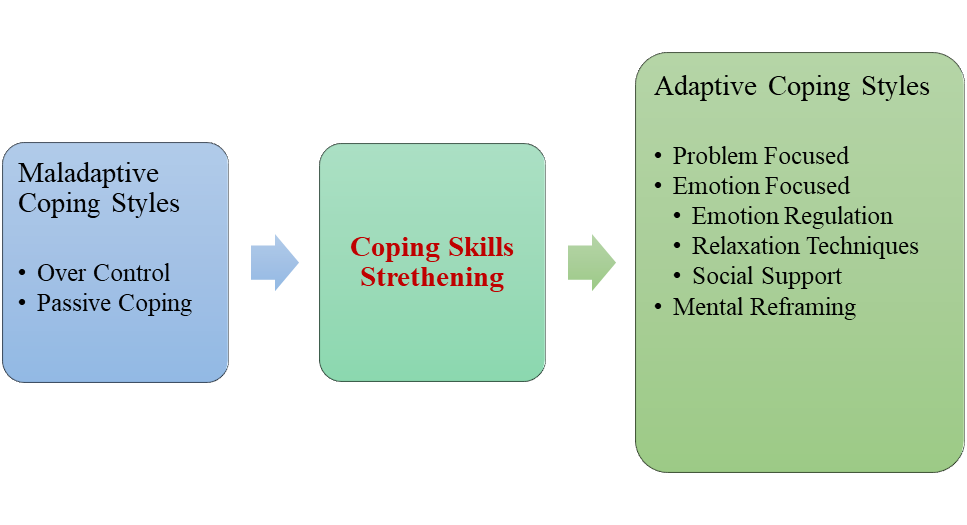Coping Skills Strengthening at DRHC Dubai Psychiatry Clinic
Life, as we all know, is not always a smooth sailing journey, with multiple challenges along the way. These challenges may be in the form of different stressors in life and can sometimes be very overwhelming.
Coping is defined as the process of successfully dealing with or attempting to deal with challenging problems and situations in life. Different people cope with various situations in different ways. These differences can be attributed to individual personality traits, personal belief systems, familial and social support and the severity of adverse situations in their work and family lives.
Coping is a thought process, an act or a series of acts undertaken in facing a stressful or unpleasant situation or in modifying one’s reaction to such a situation. Coping skills typically involve a conscious and direct approach to problems.
Types of coping styles
- Maladaptive Coping Style
Adaptive Coping Style
Coping Skills Strengthening is a specific form of cognitive and behaviour strategy to move from maladaptive coping styles to adaptive coping styles

Maladaptive Coping Styles:
Over Control:
This coping style in seen when individuals try to excessively control the challenging situations and problems in their life. They find it difficult to accept that sometimes it may be extremely difficult to personally control a particularly difficult situation and their control may be limited. They may start obsessively thinking about the situation and try to “figure out” how to resolve the problem.
Passive Coping:
This is the reverse of the above coping style. In this, individuals underestimate how much personal control they have in a given situation. They often deny any personal responsibility and give up the control of their actions in problematic situations.
Some examples of passive coping strategies include:
- Complaining to others.
- Avoiding challenging activities.
- Relying on self-medication or addictions to cope with difficult emotions.
Adaptive Coping Styles
Problem-Focused Coping:
This approach is focused on taking an action to solve the challenging problem an individual is facing. It is helpful when there is a need to modify the situation, or, in some cases, it may also require removing the stressful situation from life.
Techniques can be learnt in how to effectively deal with the difficult problem. Some of the coping skills in this approach include as follows:
- Prioritising the problems in order of their of severity with how easy or difficult it would be solve the problem.
- Efforts made to focus on one problem at a time and find as much information to resolve the problem.
- If the problem is too complicated, it may be divided into manageable parts, and address each part of the problem one at a time.
- Removal of the stressful situation may be also done in small incremental steps.
Emotion-Focused Coping
This strategy is used when the problems are too challenging and it is difficult to change the situation or when situations are out of control. In this approach, cognitive and behavioural strategies are used to focus on how to effectively handle the emotions associated with the challenging problem.
- Emotional regulation – It involves recognizing and being aware of the emotions an individual is experiencing in association with a particular problem. Techniques are taught to effectively managing one's emotional responses to the problem.
- Relaxation techniques – Various relaxation techniques can improve the emotional resilience and reduce anxiety associated with different problems. Some of these techniques include – Practicing mindfulness, deep breathing, or meditation
- Social support – This involves seeking support and comfort from friends, family, or support groups. Sharing the problems and feelings with loved ones (friends or family) or with individuals who have had similar experiences (support groups) provides a sense of relief and comfort to the individual.
Mental Reframing
This strategy involves taking an emotion or a problem and thinking of it in a different way. A common thought that comes automatically whenever facing any difficulty or problem is “Why does it always happen to me?”. Instead of allowing the thought to take root in mind, mental reframing is a skill that involves changing the thought or thinking about the situation in a different way, like, “This has happened to me multiple times, let me do something about it so it doesn’t happen again, let me figure out a solution for it.”
This technique can bring about a significant change in an individual’s perspective about tough situations in life. However, this techniques requires needs to be learnt and practiced regularly so as to become effective.
Coping Skills Strengthening as a Psychological Therapy can be utilized to deal with the challenges in workplace or in personal life. It is also done in individuals suffering with depression or anxiety disorders along with medications to help them improve and strengthen their mental health. It is a valuable approach to provide immediate help and support to individuals in distress and help them regain their emotional stability and resilience. Please get in touch with best psychiatry doctor if you are going through a mental health crisis and require mental health intervention and support.
.png?width=281&height=59&name=bookanappointment%20(1).png)
If you are experiencing any signs and symptoms of a Coping Skills Strengthening, please don't hesitate to contact our best psychiatrist in Dubai at the Dr Rami Hamed Centre, Call +97142798200 to Schedule Your Appointment Today. We have the best psychiatrist doctor, and our psychiatry clinic is situated in Dubai Healthcare City.





.png?width=281&height=59&name=bookanappointment%20(1).png)
.png?width=1080&height=1080&name=DR%20KIRTI%20(1).png)





